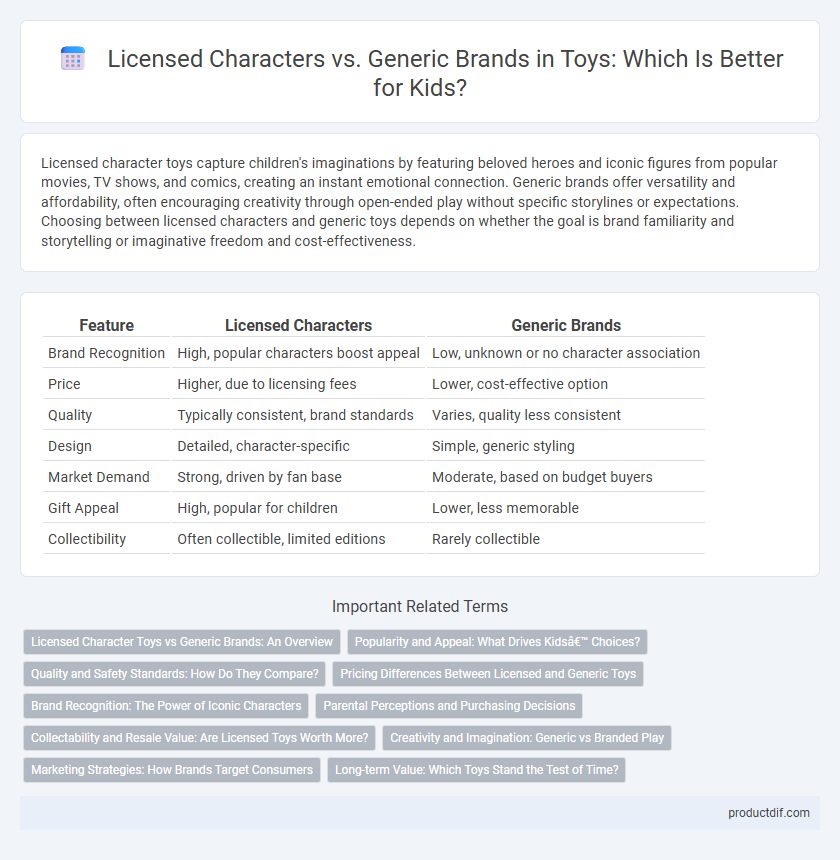Licensed character toys capture children's imaginations by featuring beloved heroes and iconic figures from popular movies, TV shows, and comics, creating an instant emotional connection. Generic brands offer versatility and affordability, often encouraging creativity through open-ended play without specific storylines or expectations. Choosing between licensed characters and generic toys depends on whether the goal is brand familiarity and storytelling or imaginative freedom and cost-effectiveness.
Table of Comparison
| Feature | Licensed Characters | Generic Brands |
|---|---|---|
| Brand Recognition | High, popular characters boost appeal | Low, unknown or no character association |
| Price | Higher, due to licensing fees | Lower, cost-effective option |
| Quality | Typically consistent, brand standards | Varies, quality less consistent |
| Design | Detailed, character-specific | Simple, generic styling |
| Market Demand | Strong, driven by fan base | Moderate, based on budget buyers |
| Gift Appeal | High, popular for children | Lower, less memorable |
| Collectibility | Often collectible, limited editions | Rarely collectible |
Licensed Character Toys vs Generic Brands: An Overview
Licensed character toys leverage the popularity and recognition of established franchises like Marvel, Disney, and Star Wars, driving higher consumer demand and often commanding premium pricing. Generic brand toys typically offer greater affordability and creative variety but lack the built-in audience that licensed characters provide. Market data reveals licensed toys consistently outperform generic counterparts in sales due to strong brand loyalty and media tie-ins.
Popularity and Appeal: What Drives Kids’ Choices?
Licensed characters dominate kids' toy choices due to their strong associations with popular media franchises like Disney, Marvel, and Paw Patrol, which create immediate recognition and emotional connections. The familiarity and storytelling tied to these characters enhance their appeal, making licensed toys more desirable and often commanding higher sales compared to generic brands. Generic toys rely on creativity and uniqueness but often struggle to match the widespread popularity and instant appeal driven by licensed characters' established fan bases.
Quality and Safety Standards: How Do They Compare?
Licensed characters often adhere to stricter quality and safety standards due to rigorous brand guidelines and regulatory oversight imposed by licensors. These toys undergo extensive testing for non-toxic materials, choking hazards, and durability to ensure they meet international safety certifications like ASTM F963 and EN71. In contrast, generic brands may vary widely in compliance, sometimes lacking the same level of quality control, which can increase the risk of inferior materials and safety issues.
Pricing Differences Between Licensed and Generic Toys
Licensed toys featuring popular characters typically command higher prices due to royalties and brand value associated with franchises like Disney or Marvel. Generic toys, lacking these licensing fees, offer more affordable options while maintaining similar play functionality and quality. Consumers often weigh cost differences against brand appeal and collectible value when choosing between licensed and generic toy products.
Brand Recognition: The Power of Iconic Characters
Licensed toys featuring iconic characters like Marvel superheroes or Disney princesses leverage strong brand recognition, driving higher consumer trust and engagement compared to generic brands. These characters embody established stories and emotional connections, making them instantly recognizable and desirable, which significantly boosts sales and market presence. Retailers benefit from the built-in audience and marketing support that licensed brands provide, creating consistent demand and competitive advantage.
Parental Perceptions and Purchasing Decisions
Parental perceptions strongly favor licensed character toys due to their familiarity, trustworthiness, and emotional connection with children, which significantly influences purchasing decisions. These toys often carry perceived higher quality and safety standards compared to generic brands, making them more appealing to cautious parents. Price sensitivity remains a factor, but the marketing power of licensed characters typically drives greater sales despite potentially higher costs.
Collectability and Resale Value: Are Licensed Toys Worth More?
Licensed toys featuring popular characters like Marvel superheroes or Disney princesses typically hold higher collectability and resale value due to brand recognition and fan demand. Generic brand toys often lack the established fan base, resulting in lower market desirability and resale prices. Collectors prioritize limited editions or officially licensed items, driving their worth significantly above non-branded alternatives.
Creativity and Imagination: Generic vs Branded Play
Licensed characters inspire creativity by connecting children to familiar stories and personalities, enhancing imaginative play through established narratives. Generic toys encourage open-ended creativity by allowing kids to craft their own stories without predefined constraints, fostering original thinking and innovation. Both types of play contribute uniquely to a child's cognitive and social development by balancing structured and unrestricted imaginative experiences.
Marketing Strategies: How Brands Target Consumers
Licensed characters leverage established fan bases to create instant trust and emotional connections, driving higher engagement and sales through storytelling aligned with popular media. Generic brands focus on versatility and affordability, targeting budget-conscious consumers and emphasizing product quality or innovation in their marketing campaigns. Brands using licensed characters often employ cross-promotions and limited-edition releases to capitalize on brand loyalty and seasonal trends.
Long-term Value: Which Toys Stand the Test of Time?
Licensed character toys such as Star Wars, Marvel superheroes, and Disney princesses consistently hold higher long-term value due to ongoing media exposure, nostalgia, and collector demand. Generic brand toys often lack the cultural resonance and recognizable appeal that drive sustained interest and aftermarket prices. Investing in licensed toys provides better potential for appreciation as timeless franchises continue to captivate new generations.
Licensed characters vs generic brands Infographic

 productdif.com
productdif.com